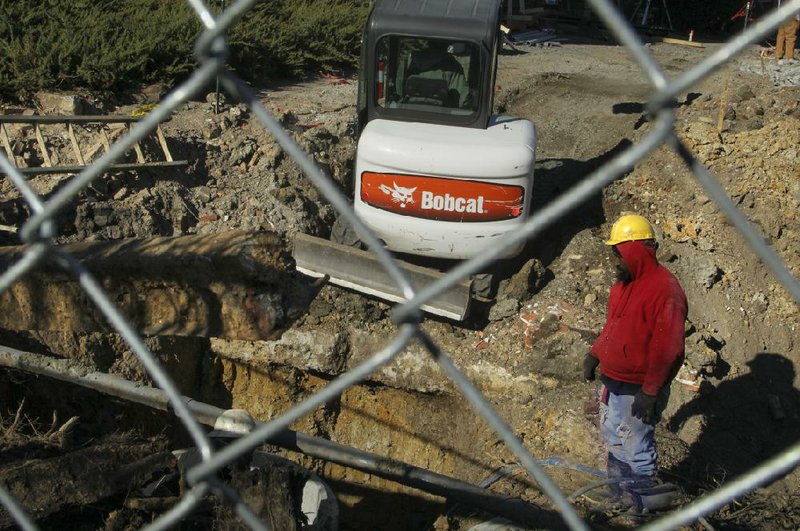Excavation work for construction of a parking deck in Little Rock’s River Market District has turned up a rare find that is now in the possession of the Historic Arkansas Museum.
Workers recently uncovered an encrusted, curved sword possibly dating from the early 1800s at the site of the future Heritage Center parking deck, 253 E. Markham St., just east of Scott Street. The site, owned by H West LLC, once housed the Ashley mansion built by Chester Ashley, a prominent Little Rock lawyer and U.S. senator in the early 1800s.
Clark Construction representatives took the sword Tuesday to the Historic Arkansas Museum, 200 E. Third St., said Swannee Bennett, the museum’s chief curator. The museum is directly behind the excavation site.
“They were kind enough to bring it by and show it to us,” Bennett said Wednesday, adding that the soil-encrusted sword must undergo delicate testing to better determine its age. “We’re a small community, and everybody sort of knows us.
“I was ecstatic to see it,” he said. “It’s remarkable that it survived all this time.”
The curved sword, Bennett said, is a military sword of either American or European origin.
“The curve of the blade and its general overall style tells me it’s a cavalry blade, probably early 19th century,” Bennett said. “The location is the site of Chester Ashley’s home sometime during the period between 1819 and 1836. … We know the house was razed sometime before World War I.
“This definitely may be the earliest object found,” he added, noting that there were formal, archaeological excavations of the historic site during in the 1980s. “It’s a very nice blade. But it’s pretty rough. It’s still encrusted with soil, and I’m not sure what some of the deposits are on it.”
The Ashley mansion was originally built around 1820, then enlarged to two stories by 1840 with thick, brick columns in front. Union forces occupied the Ashley house in the latter stages of the Civil War after taking control of Little Rock in September 1863,Bennett said.
While the find is historic, the random unearthing of artifacts that could be important to the city’s or the state’s history is a concern, said Ann M. Early, the state archaeologist at the Arkansas Archeological Survey in Fayetteville. The survey’s mission is to conserve and research the state’s heritage.
While “people have the right to dig holes on their own property,” Early said, she cautioned that everyone should “be sensitive to the possibility that something unusual and important could still be underground” that’s worth studying before it might be destroyed.
“History is buried under the ground,” Early said. “Even though there’s 100 years worth of construction somewhere doesn’t mean that there aren’t intact historic remains present.
“Sometimes people just assume everything has been wiped away,” she added. “You can learn amazing things about the history of a community from what is under the ground, without doing away with development and progress. … Every hole that’s dug in the riverfront area in Little Rock is likely to hit something from the past.”
Ashley, a Massachusetts native who lived from 1791 to 1848, moved to Little Rock in 1820, and became considered as the “pre-eminent appellate attorney of the period,” according to the online Encyclopedia of Arkansas History and Culture. Ashley’s law partnership with Robert Crittenden is a forerunner to the Rose Law Firm in Little Rock, according to the firm’s history on its website.
Ashley was elected to the U.S. Senate in 1844. Ashley County is named for him, as are Chester and Ashley streets in Little Rock. Ashley is buried in Little Rock’s Mount Holly Cemetery.
“Its possible some Confederate or Union army personnel could have lost the knife, or it could have belonged to Chester Ashley,” Bennett said. “Ashley was a mover and shaker and could have afforded a sword. … In fact, Arkansas territorial Gov. George Izard appointed Ashley to the rank of colonel in the [Arkansas territorial] militia.”
Arkansas, Pages 9 on 01/16/2014

